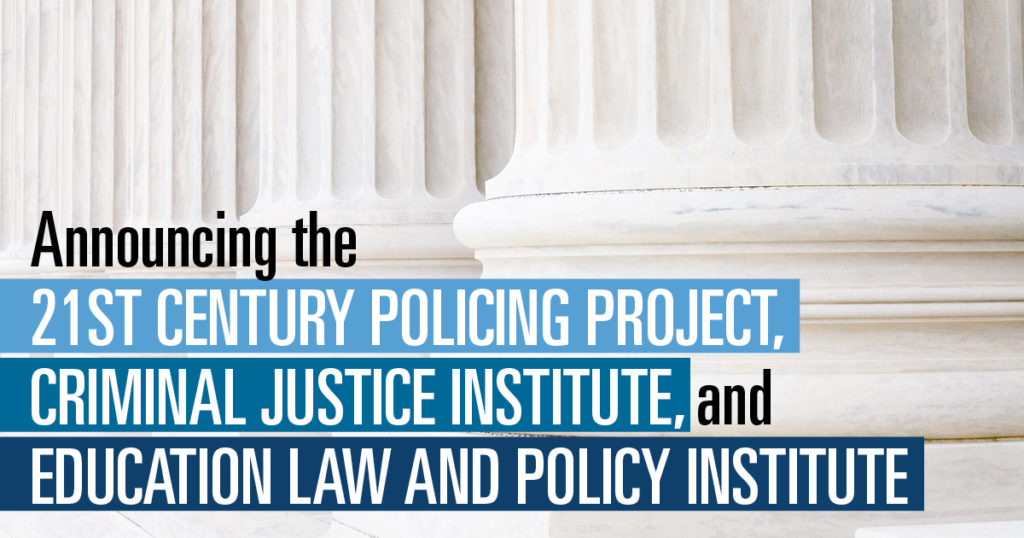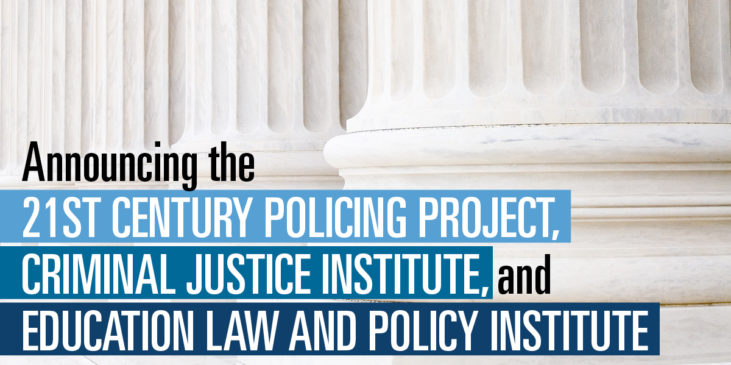
Programs Will Prepare Future Lawyers to Address the National Crises of the Past Year
New York, NY (April 7, 2021) – New York Law School (NYLS) Dean and President Anthony W. Crowell today announced the establishment of three major programs to prepare law students to lead on issues of policing, public education, and criminal justice as the nation rebuilds from the events of 2020. Of note, NYLS’s 21st Century Policing Project (P21) is headed by a former full-time NYPD Detective, making it unique among academic programs on policing.
“The past year has yielded a fundamental rethinking of our systems of public education, policing, and criminal justice,” Dean Crowell said. “Lawyers will lead the way in reimagining how to build more just, effective, and equitable frameworks in these areas, and New York Law School stands ready to train them.”
“These new institutes will allow our students to be on the front lines of cutting-edge social justice work,” said Richard Marsico, Professor of Law and Director of the Impact Center. “They address the defining issues and challenges of our time.”
The new institutes will be housed in NYLS’s Impact Center for Public Interest Law. The P21 initiative will also work closely with NYLS’s Center for New York City Law. These programs are a core part of NYLS’s forthcoming update to Strategic Plan 2020: Ever Upward, which will reframe the School’s strategic goals in the wake of the pandemic and the national dialogue on racial justice.
The 21st Century Policing Project (P21)
The 21st Century Policing Project (P21) is aimed at boldly advancing the racial justice and police reform demanded by, and needed in, communities locally, statewide, nationally, and globally. The Project will develop strategies with law enforcement departments and municipalities around the country to implement police reforms and to improve the relationship between police departments and the diverse communities they serve. Its activities include legal and policy advocacy, thought leadership, comparative analyses of different policing and Civilian Complaint Review Board models, on-site assistance to local jurisdictions, and robust engagement in the American Bar Association’s Legal Education Police Practices Consortium. P21 student fellows will support this work. The initiative also includes a new course offered beginning in spring 2021: Policing the Police. Through these efforts, NYLS aims to make substantive contributions to police reform across the United States. P21 is led by Professor Kirk D. Burkhalter ’04, a retired Detective, First Grade with 20 years of experience in the NYPD, making the program unique among academic programs on policing.
Criminal Justice Institute
As attention to criminal justice reform grows and a new generation of progressive prosecutors reshapes the field, NYLS is launching the Criminal Justice Institute. The Institute brings together sectors of the criminal justice system that are often siloed to find solutions that reduce both crime and incarceration. Led by faculty members with expertise in prosecution and criminal defense, the Institute seeks bold, effective, and enduring reform. It hosts lectures, panels, and workshops, providing a forum for some of the most pressing questions of criminal justice reform, such as mass incarceration, racial disparities in the system, fiscal inefficiencies, prosecutorial ethics, prison conditions, police reform, and measures to help offenders resume productive lives. In the spirit of NYLS’s broader effort to ensure that legal education has real-world impact, the Institute offers students a chance to meet and work with practitioners, academics, government officials, and reformers whose work impacts this field. And in keeping with NYLS’s related commitment to forging connections to the broader legal community, the Institute continues building bridges with individuals, agencies, and institutions that work on criminal justice in New York City. The Co-Directors of the Criminal Justice Institute are Professor Justin Murray, a former public defender in Washington, D.C., and Trustee Professor Rebecca Roiphe, a former Manhattan prosecutor.
Education Law and Policy Institute
NYLS is launching the Education Law and Policy Institute at a time of unprecedented learning loss for New York City schoolchildren. The COVID-19 pandemic has highlighted and exacerbated the systemic exclusion of low-income Black, Latinx, and special education students from a quality education. Through the Institute, NYLS students advance education equity and access for New York City’s most vulnerable children through direct representation, advocacy, and policy reform. Students collaborate with civil rights organizations to increase access to broadband internet, connect students to special education services, implement trauma-informed approaches to teaching and discipline, end the school-to-prison pipeline, implement restorative justice, desegregate schools, and expand language access. The Institute also offers technical assistance and training to public school teachers and administrators in upholding students’ rights, as well as “know-your-rights” workshops for students and their parents on special education, discipline, and juvenile justice. Through the Institute, students, educators, and attorneys can collaborate on campaigns, articles, and events that address the most pressing education issues. This initiative complements and supports NYLS’s extensive work in children and family law, racial justice, and law school pipeline programs—helping meet the rapidly growing demand for attorneys with this critical expertise. The Director of the Education Law and Policy Institute is Professor Samantha Pownall ’11, who taught public high school students before beginning her legal career.

